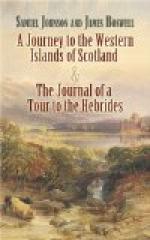Raasay is the only inhabited island in Mr. Macleod’s possession. Rona and Fladda afford only pasture for cattle, of which one hundred and sixty winter in Rona, under the superintendence of a solitary herdsman.
The length of Raasay is, by computation, fifteen miles, and the breadth two. These countries have never been measured, and the computation by miles is negligent and arbitrary. We observed in travelling, that the nominal and real distance of places had very little relation to each other. Raasay probably contains near a hundred square miles. It affords not much ground, notwithstanding its extent, either for tillage, or pasture; for it is rough, rocky, and barren. The cattle often perish by falling from the precipices. It is like the other islands, I think, generally naked of shade, but it is naked by neglect; for the laird has an orchard, and very large forest trees grow about his house. Like other hilly countries it has many rivulets. One of the brooks turns a corn-mill, and at least one produces trouts.
In the streams or fresh lakes of the Islands, I have never heard of any other fish than trouts and eels. The trouts, which I have seen, are not large; the colour of their flesh is tinged as in England. Of their eels I can give no account, having never tasted them; for I believe they are not considered as wholesome food.
It is not very easy to fix the principles upon which mankind have agreed to eat some animals, and reject others; and as the principle is not evident, it is not uniform. That which is selected as delicate in one country, is by its neighbours abhorred as loathsome. The Neapolitans lately refused to eat potatoes in a famine. An Englishman is not easily persuaded to dine on snails with an Italian, on frogs with a Frenchman, or on horseflesh with a Tartar. The vulgar inhabitants of Sky, I know not whether of the other islands, have not only eels, but pork and bacon in abhorrence, and accordingly I never saw a hog in the Hebrides, except one at Dunvegan.
Raasay has wild fowl in abundance, but neither deer, hares, nor rabbits. Why it has them not, might be asked, but that of such questions there is no end. Why does any nation want what it might have? Why are not spices transplanted to America? Why does tea continue to be brought from China? Life improves but by slow degrees, and much in every place is yet to do. Attempts have been made to raise roebucks in Raasay, but without effect. The young ones it is extremely difficult to rear, and the old can very seldom be taken alive.
Hares and rabbits might be more easily obtained. That they have few or none of either in Sky, they impute to the ravage of the foxes, and have therefore set, for some years past, a price upon their heads, which, as the number was diminished, has been gradually raised, from three shillings and sixpence to a guinea, a sum so great in this part of the world, that, in a short time, Sky may be as free from foxes, as England from wolves. The fund for these rewards is a tax of sixpence in the pound, imposed by the farmers on themselves, and said to be paid with great willingness.




